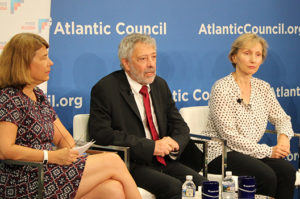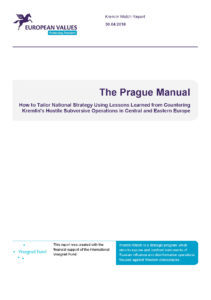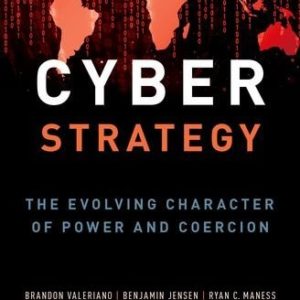 Russia is using the same disinformation playbook to sow doubt about the attempted assassination of Sergei Skripal and his daughter as it did in the case of Alexander Litvinenko’s death, Marina Litvinenko, the slain Russian intelligence officer’s widow, said at the Atlantic Council in Washington on September 11.
Russia is using the same disinformation playbook to sow doubt about the attempted assassination of Sergei Skripal and his daughter as it did in the case of Alexander Litvinenko’s death, Marina Litvinenko, the slain Russian intelligence officer’s widow, said at the Atlantic Council in Washington on September 11.
The U.S. administration is preparing a new executive order to allow sanctions of foreign citizens suspected of election interference, while the U.S. congress is also taking measures to counter ‘active measures’ by Russia and other foreign entities.
The “Defending Elections from Threats by Establishing Redlines Act of 2018,” or Deter Act, was introduced in January by Sens. Chris Van Hollen (D., Md.) and Marco Rubio (R., Fla.) establishes reporting requirements for the intelligence community, authorizes sanctions, imposes financial penalties on “senior political figures and oligarchs” and urges collaboration with the European Union and its member states to prevent Russian election interference, The Wall Street Journal adds.

Credit: CSIS
The 2019 European elections could be hit by a spate of cyberattacks, which could even prevent the European Parliament from convening, a new report from the Estonian Information System Authority has warned. The report coincides with calls to bring election rules up to speed with the digital age to protect European democracy.
The international community needs new habits for a new era, argues Tarah Wheeler, a New America cybersecurity policy fellow and senior director of data trust and threat and vulnerability management at Splunk.
“Cyberwar is the continuation of kinetic war by plausibly deniable means,” she writes for Foreign Policy. “Without a global consensus on what constitutes cyberwar, the world will be left in an anarchic state governed by contradictory laws and norms and vulnerable to the possibility of a devastating war launched by a few anonymous keystrokes.”

Madeleine Albright
Two “megatrends”—globalization and technology—are primarily responsible for weakening public support for democratic values, according to Madeleine Albright, chair of the National Democratic Institute, a core institute of the National Endowment for Democracy. “Faceless” globalization is making people “feel that they have no identity,” she told the Brookings Institution. Technology, meanwhile, disaggregates people’s voices and enables both the rapid spread of disinformation and organization of non-democratic movements, such as the Muslim Brotherhood.
But a lack of technological innovation is partially responsible for people’s dissatisfaction with democratic government. “People are talking to their governments on 21st-century technology. Governments listen to them on 20th-century technology and provide 19th-century responses,” she added.
 A new French report recommends decisive steps to counter disinformation (HT: European Values Think-Tank). The Center for Analysis, Forecasting and Strategyand the Institute of Strategic Research published a report, including 50 recommendations for different actors, and drawing on the European Values Think-Tank’s recent Prague Manual.
A new French report recommends decisive steps to counter disinformation (HT: European Values Think-Tank). The Center for Analysis, Forecasting and Strategyand the Institute of Strategic Research published a report, including 50 recommendations for different actors, and drawing on the European Values Think-Tank’s recent Prague Manual.
By providing a taxonomy of different forms and levels of state involvement in election interference, a new report – Defining Russian Election Interference: An Analysis of Select 2014 to 2018 Cyber Enabled Incidents – gives a guide to the recent history of election influence and interference, writes Damon Wilson, Executive Vice President of the Atlantic Council. From there, it posits what norms and tactics have emerged as commonalities in the behavior of nation-states, asking: How will the toolsets and norms we currently see in play shape nation-state use of technology in the future?
Interference Terminology
 If there is a single lesson from cyber activity over the last decade, it is that states must have a common lexicon in order to respond to cyber threats, argue report authors Laura Galante and Shaun Ee of the Atlantic Council’s Asia Security Initiative and Cyber Statecraft Initiative. They propose a list of terms which captures several of the actions commonly observed in modern cyber and information operations:
If there is a single lesson from cyber activity over the last decade, it is that states must have a common lexicon in order to respond to cyber threats, argue report authors Laura Galante and Shaun Ee of the Atlantic Council’s Asia Security Initiative and Cyber Statecraft Initiative. They propose a list of terms which captures several of the actions commonly observed in modern cyber and information operations:
- Vote Manipulation: An action that alters vote tallies, vote input, vote transmission, or other modes of counting and transmitting the voters’ true choices. This does not include actions intended simply to communicate a false result or otherwise cast doubt on the reliability of the vote.
- Strategic Publication: The public release of data that is obtained illicitly, typically through Infrastructure Exploitation, with the intent to embarrass, expose, or otherwise cast the subject in a negative light.
- False-Front Engagement: The fabrication of a false public identity by a person or group that subsequently takes actions to communicate, provoke, organize, or otherwise interact with others using the false identity.
- Sentiment Amplification: An action that increases the dissemination and prominence of a specific viewpoint. Sentiment Amplification can be conducted overtly, in which case the actor is clearly identifiable and there is no question of proper attribution. Covert Sentiment Amplification intentionally obscures the actor either by taking the form of False-Front Engagement or appearing to minimize the role of any actor behind the action.
- Fabricated Content: The propagation of written or broadcast information that is false in nature or embellishes the truth.
 The report makes several recommendations, including:
The report makes several recommendations, including:
- Governments, security researchers, and others privy to the evolving tactics and evidence of Interference Actions taken by states and non-state actors should continue to expose these actions. Exposure in this domain has shown to be the necessary predicate for understanding and countering malicious activity.
- Journalists, analysts, and other parties responsible for characterizing Interference Actions and influence operations should take all reasonable efforts to accurately describe the particular action at hand. Vague terminology, and in particular the muddling of Infrastructure Exploitation, Vote Manipulation, and Sentiment Amplification, has led to critical misunderstandings in the public sphere.
- The United States, along with other nation-states that traditionally value freedom of speech, expression, and a critical media environment, should be wary of classifying influence operations and Sentiment Amplification efforts as breaches of state sovereignty. While the dark side of global interconnectivity is increasingly becoming clear outside of security circles, the temptation to deem all foreign influence and interference operations as existential threats and breaches of state sovereignty undermines the varied information environment that allows democracies to thrive…..RTWT
Countering Russia: Assessing New Tools
 The scope of Russia’s efforts to undermine democracy is broad, and there is limited indication that Russia is deterred by any of the policy measures that have been undertaken to date, said Elizabeth Rosenberg, Director and Senior Fellow Energy, Economics, and Security Program with the Center for a New American Security.
The scope of Russia’s efforts to undermine democracy is broad, and there is limited indication that Russia is deterred by any of the policy measures that have been undertaken to date, said Elizabeth Rosenberg, Director and Senior Fellow Energy, Economics, and Security Program with the Center for a New American Security.
Congress has used coercive economic and financial measures to push back against this malign activity, but those tools must be used wisely, in conjunction with other financial, diplomatic, and military tools, and in coordination with allies, she said in testimony before the Senate Committee on Banking, Housing, and Urban Affairs, outlining financial transparency measures to push back against the flow of Russian money into the financial system.
 The political willingness to use sanctions tools in a sustained and coherent fashion, together with high-level signaling expresses resolve to change Putin’s behavior, argues Daleep Singh, Nonresident Senior Fellow with the Atlantic Council’s Global Business and Economics program. Escalation can take two general forms: increasing the scope of existing sanctions to cover a broader set of targets, or deepening the scale of impact on any particular individual or institution. Sanctions can go broader, deeper, or both, he contends, proposing an illustrative set of options:
The political willingness to use sanctions tools in a sustained and coherent fashion, together with high-level signaling expresses resolve to change Putin’s behavior, argues Daleep Singh, Nonresident Senior Fellow with the Atlantic Council’s Global Business and Economics program. Escalation can take two general forms: increasing the scope of existing sanctions to cover a broader set of targets, or deepening the scale of impact on any particular individual or institution. Sanctions can go broader, deeper, or both, he contends, proposing an illustrative set of options:
- First, costs should be broadened to include the very highest levels of the Russian government. At a minimum, Treasury and other authorities should conduct a study that attempts to identify the location, holdings, and financial intermediaries that manage and benefit from Putin’s wealth. Even in the unlikely scenario that this effort has no effect on Putin’s geopolitical calculus, it will signal to the Russian people that our quarrel is not with them, and it might provide a measure of transparency on his fortunes held abroad.
- Second, U.S. investors should be prohibited from purchasing new Russian sovereign debt. In 2014, I was more cautious about the unpredictable spillover effects that could result from a sudden disruption to Russia’s risk-free, benchmark asset, particularly during a period of acute stress. To be clear, this is still a serious step — but circumstances have changed. Russia is far better able to absorb a hit to its sovereign debt market, considering the background conditions described earlier, and investors have had years to reduce exposures in Russia.
 Third, while I am not in favor of prohibitions on secondary market trading of Russian assets as a general matter, there is merit in constructive ambiguity. Requirements on U.S. persons to disclose any existing holdings of Promsyvazbank (Russia’s designated bank to service the defense sector), and possibly VEB, would be an effective step to generate a broader chilling effect, especially if it includes a grace period. ….
Third, while I am not in favor of prohibitions on secondary market trading of Russian assets as a general matter, there is merit in constructive ambiguity. Requirements on U.S. persons to disclose any existing holdings of Promsyvazbank (Russia’s designated bank to service the defense sector), and possibly VEB, would be an effective step to generate a broader chilling effect, especially if it includes a grace period. ….- Fourth, a comprehensive package to counter Russian aggression requires an offensive economic strategy in its near abroad, not only to Ukraine but also to Georgia, the Baltics, Moldova, and possibly central Asia. Possible steps could include conditions-based financial support to reinforce long-standing IMF priorities in the region to improve the rule of law, battle corruption, and implement market-oriented reforms. The overarching purpose is to create successful alternatives to Russian-style autocracy.
- Finally, I would strongly encourage a robust campaign to improve transparency within Russia. Distributing verifiable evidence of corruption, and the dependence of the current regime on kleptocracy, would help to counter the government’s disinformation campaigns and its control of the media. Working with the IMF and other multilateral institutions could also shine a light on the basic challenges of doing business in Russia – enforcing contracts, protecting intellectual property, and defending property rights….RTWT







